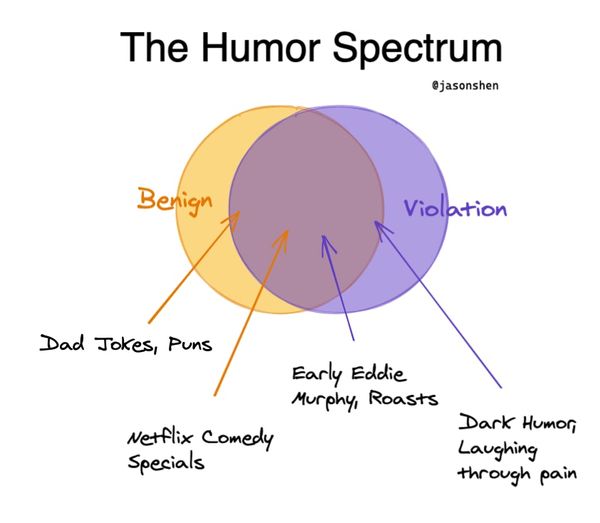Hi everyone!
This is the 12th edition of Making Connections, where we take a random (illustrated) walk down tech, fitness, product thinking, org design, nerd culture, persuasion, and behavior change.
1. 🌗 Coping with dark humor
In MC#010 we talked about how humor is a kind of benign violation. Interesting, you say, on a theoretical level. But who cares? Why does being funny and having a sense of humor matter?
Well, first off it makes you more resilient. A study of healthy Holocaust survivors found a number of traits that comprised a "plastic shield" (presumably where awful shit just slides off) - including a dark sense of humor, which "provided a critical sense of perspective". If you can laugh in dark moments, you can keep going.
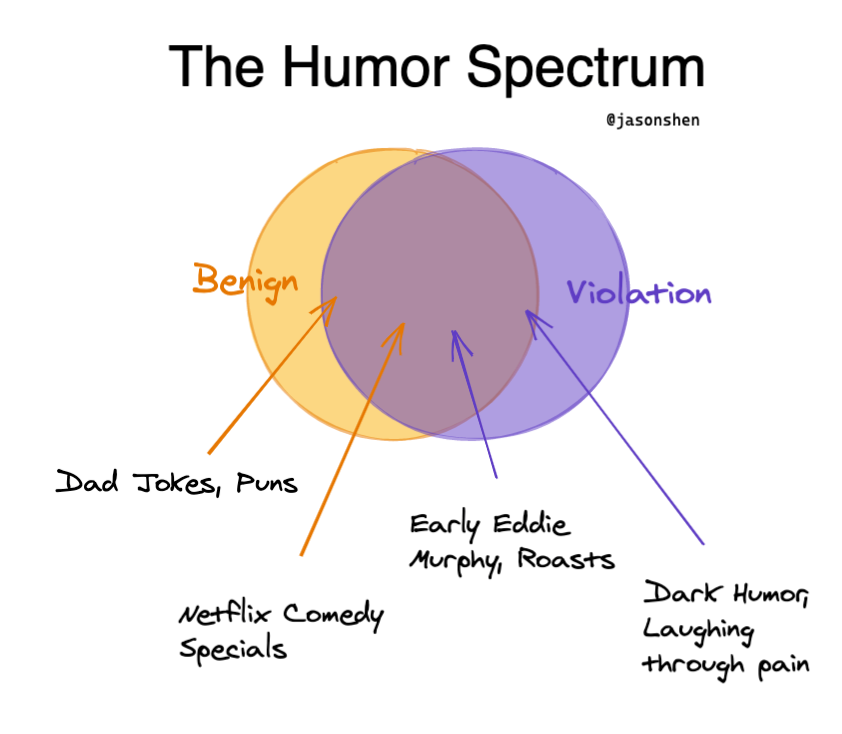
According to Sophie Scott, a professor of cognitive neuroscience at the University College London, dark humor is often used in high stress jobs in medicine and law enforcement. To some degree it seems, the shock factor also serves as a sort of bonding - only people like them get it.
People in these professions tend to heavily deploy humour that would be dark or sort of shocking to people outside their professional circles, which is not uncorrelated with its purpose: they’re using laughter as a way of coping with stress, to make the specific stress they’re dealing with more tolerable, and to increase and maintain the bonds they have with their fellow team members. Which is a crucial function, as these are professions where people really need to work as a team. This type of humour is also designed to exclude people w ho don’t get the joke, which is part of their power for the in-group.
I remember when I was in the middle of a hard training period during my collegiate gymnastics years. We'd often make fun of people’s injuries, difficult conditioning, and other painful experiences in a way that might sound insensitive to non athletes, but was a way for us to bond and underscore a sense that we are tougher than the “civilian” students out there.
2. 👨🏾🏫 Funny teachers
Think back to your favorite teachers in school or who gave some kind of training. I’ll bet money they were pretty funny. When you’re learning something difficult, it helps to have some levity to help your brain stay focused and retain info.
This is reinforced in this very wordy title: Student Perceptions of Instructor Humor as a Predictor of Student Intellectual Stimulation, Academic Interest and Engagement
This study found a statistically significant positive relationship amongst an instructors use of humor orientation and their ability to intellectually stimulate, engage, and interest students within the course. More specifically, an instructors use of humor within the classroom acted as a predictor to students being more intellectually stimulated, interested, and engaged within that given course.
I've been experiencing a bunch of trainings both live and recorded for my new job (sorry, still can't tell you yet) and I'll second this point. A funny instructor is definitely more interesting to listen to, because you know paying attention will give you some fun results.
Even if you don’t really see yourself as a teacher, if you want to influence people in general, I think it helps to have a sense of humor. Brene Brown is a beloved speaker with some of the most popular TED talks of all time but the content is often pretty sensitive, about shame and isolation. But she brings people in through humor. Not jokes necessarily but just poking fun at herself, which makes her more relatable and human and thus trustworthy. Just watch the first 1 mins of this video and tell me you didn't laugh!

3. 🎭 Sarah Cooper's comedic training
So how do you get good at humor? Well, you gotta practice. Duh. Humor is a skill just like empathy or persuasion. You may be familiar with the work of Sarah Cooper, who’s Trump lip sync videos have gotten millions and millions of views.
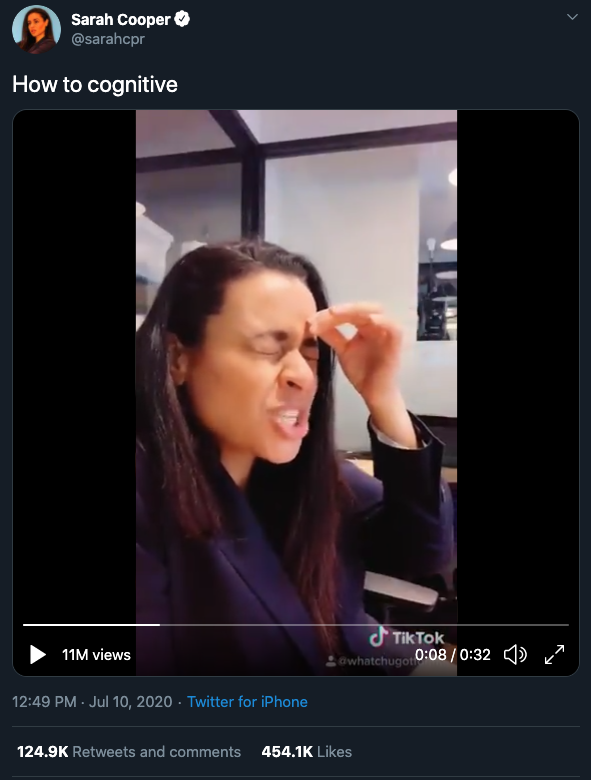
Here's her follower count after her videos blew up:
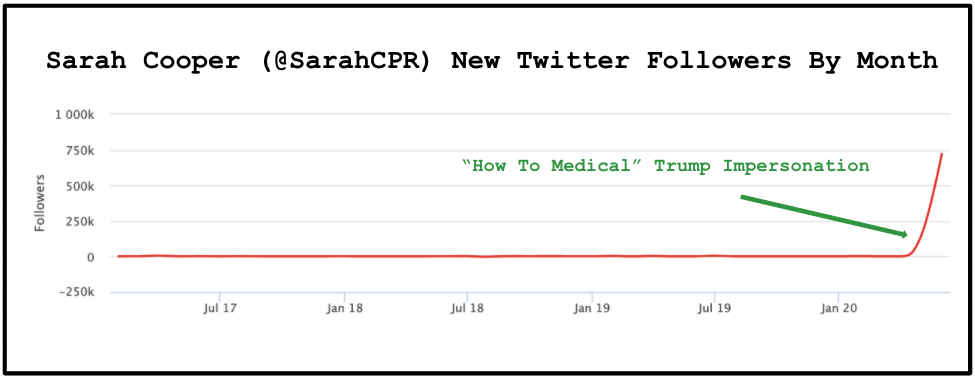
(Image via Trung T. Phan)
In many ways, her immense rise caught her by surprise. From an interview in The Atlantic:
She hadn’t even caught the press conference live; she’d heard about it from her husband afterward, found the remarks ridiculous, and made fun of them with a 49-second riff. “My impostor syndrome is kicking in,” she told me this week over the phone. “I’m like, ‘Wait, I didn’t actually write anything.’ I didn’t actually work very hard on this at all, so what does that say about me, that I went viral with something I basically spent an hour on?” She laughed. “I’ll just chalk it up to years and years of trying different things to get to this point.”
Trung T. Phan has a great write up of how Cooper developed her offbeat brand of humor over time, transitioning from being a UX researcher at Google to how she does her drawings (traces real photos) to her tweets. It's a great reminder that overnight sensations are 10 years in the making.
In an effort to outline her 10,000-hour comedic journey, I went through hundreds of Cooper’s tweets, blog posts and videos.
Here are two key takeaways from my research:
Keep experimenting. Gary Vaynerchuk equates social apps and digital tools to “crayons” that can be used to create new types of art. Cooper has experimented with every “crayon” available to find her comedic voice.
Work in public. To find success, Cooper says, “You need to do a lot of work. You need to finish a lot of work. You need to share a lot of work.” The lesson here is that you never know who’s reading, watching or listening. If you’re already creating, you might as well put it out there and give your audience a chance to find you.
4. 😅 Are YOU funny? (quiz)
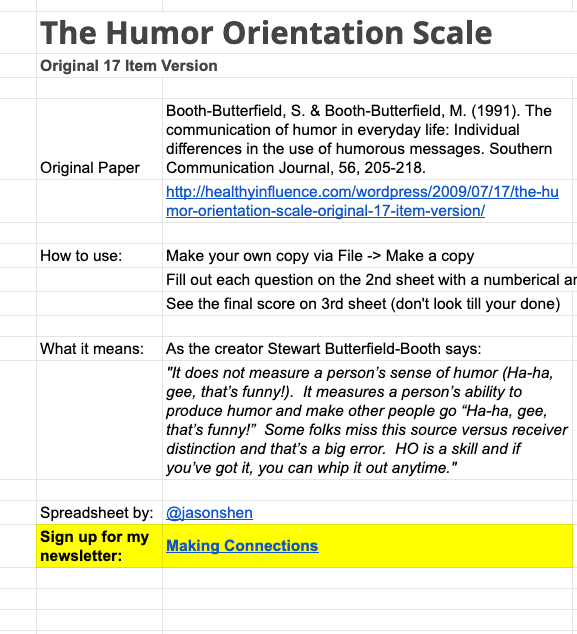
So how does the academic research evaluate whether someone is funny or not? I looked into it, and often they’ll use something called the Humor Orientation Scale (HOS), which was developed by two psychologists in 1991. It's not super complicated, and self-reported with just 17 questions on a Likert scale, but because it was one of the first, there's good data on comparing yourself to others.
The questions themselves are posted by the researchers themselves on a blog post and the partial list includes:
- People usually laugh when I tell jokes or funny stories.
- I have no memory for jokes or funny stories.
- I can be funny without having to rehearse a joke.
- Being funny is a natural communication style with me.
But actually calculating your own humor orientation "score" and having it normalized to some kind of broad population wasn't easy.
But lucky for you, I went out and DID THE WORK. So now you can enjoy your own, semi-calibrated quiz to determine how funny you are. (You have to answer honestly or else you’re just cheating yourself though).
I think I'm building this up too much. Anyway, here’s a link to the Google Spreadsheet. Copy it and fill it in for yourself.
Take the Humor Orientation Scale Quiz
That’s all for today! If you made it to the end, congrats and thanks!
Jason
PS - What do you think of this quiz? I have others I want to make based often on academic research scales but only if you all care / find them interesting. LMK! Also tell me how you scored and I’ll tell you mine.
